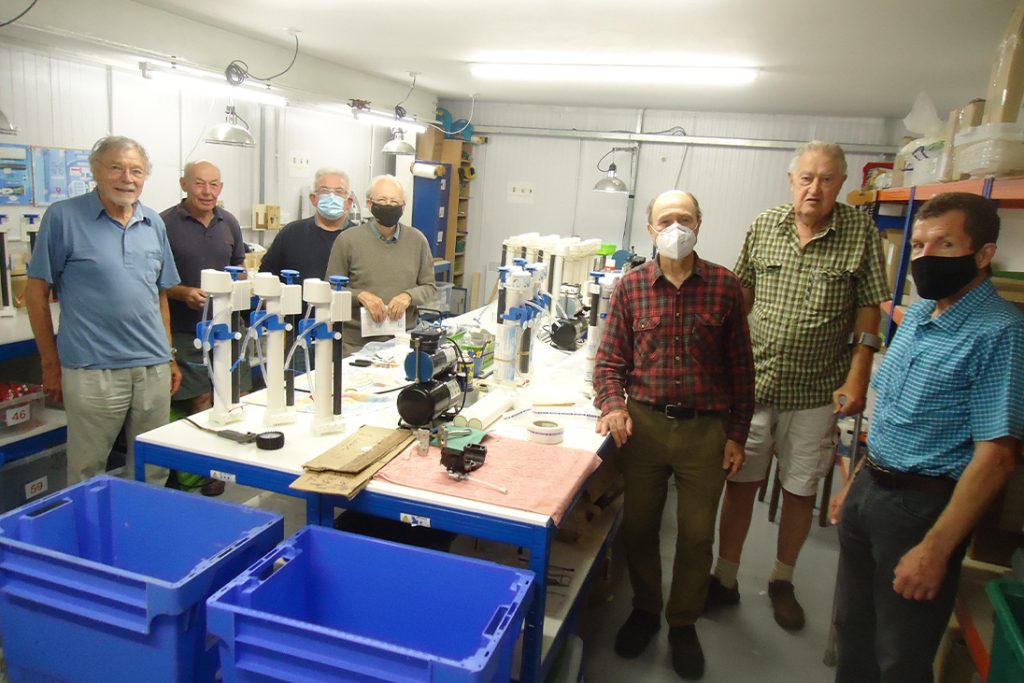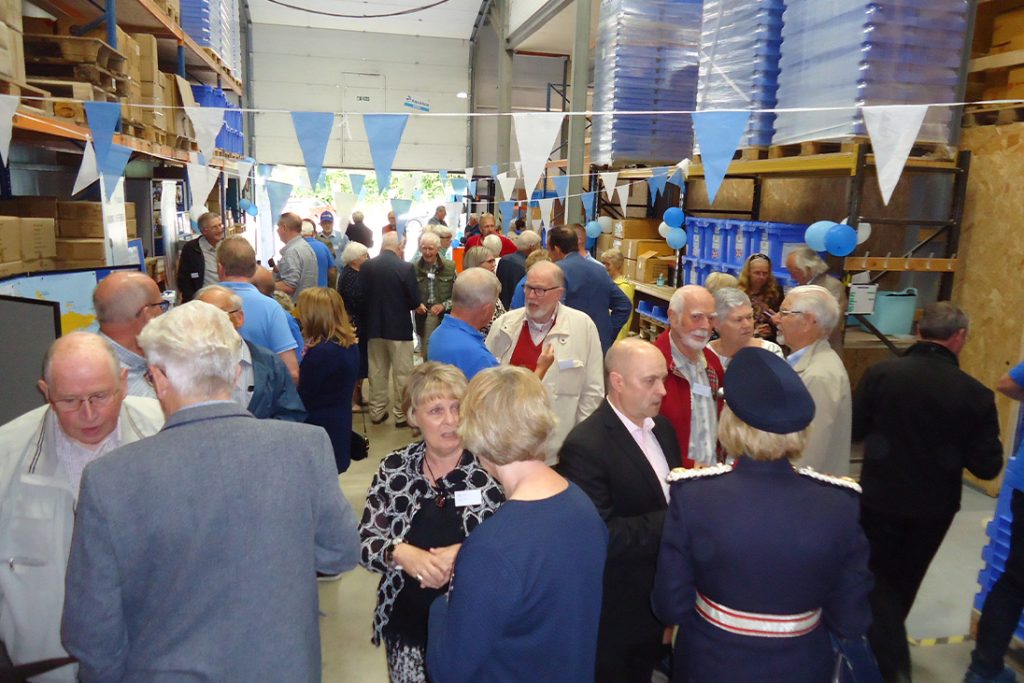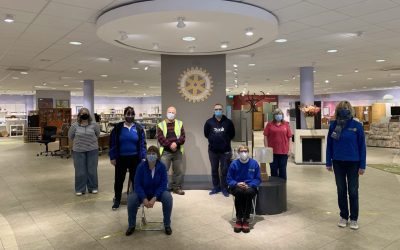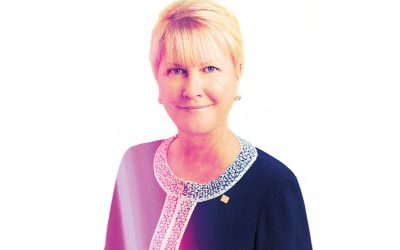Aquabox, the Rotary charity based in Derbyshire, has celebrated its 30th birthday – and has continued to send water filters and humanitarian aid to disaster zones and conflict areas around the world, despite the Covid-19 pandemic.
Scores of guests gathered at the Aquabox depot in Wirksworth in June to celebrate the charity’s birthday, with a speech of welcome by Mrs Elizabeth Fothergill CBE, Lord-Lieutenant of Derbyshire. “It is my pleasure to be here to celebrate the 30th birthday of a quite remarkable Derbyshire charity which has made a massive impact around the world,” she said.
Listen to this article
It was in 1991 when two members of Wirksworth Rotary Club, Mike Hoole and Peter Hare, came up with a way to improve on the club’s charitable work.
Wirksworth Rotary Club members were already contributing to an emergency box scheme initiated by the Rotary Club of Denton, helping to fill wooden boxes of humanitarian aid which were sent to disaster areas around the world.
Mike and Peter’s idea was to replace the wooden box with a plastic crate so that with the addition of a charcoal filter, chlorine sterilising tablets and a tap, the crate could be used as a water reservoir and filter, to convert polluted water into safe drinking water.
That led to the creation a year later of a new charity, named Aquabox. But there was a financial hurdle at the outset: the plastic box manufacturer stipulated a minimum order of 3,000 boxes at a cost of £30,000, money the club didn’t have. But Wirksworth Rotary Club members rose to the challenge, and personally underwrote this commitment to the tune of £1,000 each.


A team of volunteers helping to produce Aquabox’s revolutionary water filter.
During its first 10 years, Aquabox aid was sent to disaster zones across the world: Africa, the Caribbean, south America, south-east Asia and even North Korea.
Aid was also sent to conflict zones like Kosovo, Croatia and Serbia, supporting families caught up in the Balkan wars.
The 2004 tsunami presented the charity with a new challenge, and volunteers and Rotarians across the country worked around the clock to pack chlorine tablets, and fill and dispatch Aquaboxes to countries worst hit by this devastating natural event.
Then in 2010, Aquabox was approached by John Griffith, who had developed a simple ultra-filtration hand pump to convert polluted water into clean, safe water for drinking, for cooking and for washing. This was a giant leap forward: instead of using a carbon filter and chlorine tablets to provide safe drinking water for a few months, the new pump could process thousands of litres of water – and it could go on working for years.
The Aquabox family filter, designed to meet the needs of an average family, went into production in 2011.
John Griffith helped to set up a filter assembly operation at Aquabox’s Wirksworth depot, and teams of volunteers were recruited and trained to assemble and test the new filters.
All of this has been funded almost entirely by donations, notably donations from Rotary clubs across the British Isles.”
Over time the original design has been refined and improved – currently the teams are assembling the Mk3 version – and in 2016 the charity was honoured with the Queen’s Award for Voluntary Service, the highest award a charity can receive.
When Covid-19 arrived in early 2020, the Aquabox trustees realised it would have a serious impact on the charity. Most of its filter assembly and box packing volunteers are retired, and were judged particularly vulnerable to the virus, so normal activities had to be curtailed.
But it also created the opportunity to move to a new depot on the same estate, fitted out and decorated by volunteers, so that when production was able resume after lockdown, it was in a much more efficient environment.
Fortunately, the charity had built up stocks before the pandemic, so it was able to continue to send filters and aid while the depot move was going on.
“We managed to send shipments to both Yemen and Syria, as well as a further shipment to Nepal,” said Roger Cassidy, chair of trustees.
“And we also bought in a further consignment of Mk3 filters to supplement our own stock, which meant we were able to send aid to Beirut after the disastrous explosion in August 2020.
“We got the volunteers back into the new depot and resumed production in time to meet the new demand from Ukraine – so far we have sent five shipments, with more planned.”


The Aquabox team celebrating the organisation’s 30th birthday.
Since Aquabox switched to assembling the ultra-filtration pumps in 2011, the volunteer teams have manufactured more than 24,000 filter units and sent them to disaster areas and conflict zones around the world.
The ultra-filtration core filters down to 0.02 of a micron (a micron is one thousandth of a millimetre) – and that’s smaller than the smallest known water-borne disease pathogen, so nothing gets through.
The filter protects against cholera, typhoid, polio, dengue fever, guinea worm and many other water-borne diseases. A simple daily back-flushing process clears the accumulated bacteria and viruses, and leaves the filter ready for further use, and every filter has the capacity to process up to half a million litres of water.
Over the past 30 years, Aquabox filters have provided untold thousands of people living in extreme deprivation with access to safe, clean water for drinking, for cooking and for washing. It’s almost entirely the work of unpaid volunteers – even now, there is only one paid staff member, and he’s a part-timer.
All of this has been funded almost entirely by donations, notably donations from Rotary clubs across the British Isles. There is no way of knowing how many lives have been saved by Aquabox’s intervention, but it must be a huge number.
And it all began with two Wirksworth Rotarians who saw the need for clean, safe water – and who had the vision and the drive to do something about it.


























































